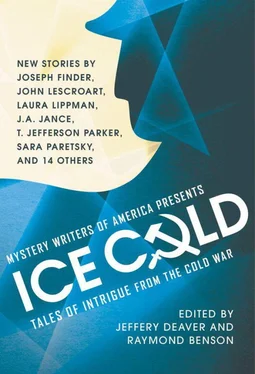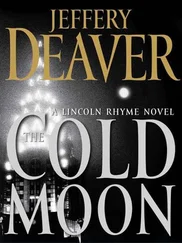Harbison could see only a portion of this one, but he guessed it might be fifty feet long. He knew he wouldn’t take it on, not if he were on the other side of the glass.
Not even if he could survive out there.
As the Deep Submergence Vehicle Alvin sank through the midwater, the siphonophore drifted away. Harbison craned his neck to keep it in view, hoping for the show, knowing it would come.
And then it did. Something startled the enormous creature. A stray current, perhaps, a touch from one of the sub’s two robotic arms, or merely some electrical impulse transmitted through whichever individual comprised its brain. All at once, the entire chain flared with light. An unearthly blue-green outlined its shape, and at its core, jagged crimson webs like lightning.
Even though Harbison had seen such things many times before, his breath caught. Nearly everything out here in the murky midwater could light up, glow with cold fire, but the sight always awed him.
He watched till the siphonophore, dark again, drifted out of sight. The view outside the window was empty… except for some shadowy forms that never came close enough for him to make out. Sharks? Giant squid? Something big and dangerous, most likely.
It didn’t matter. Nothing was breaching the submersible, not from outside. The three of them were safe inside the personnel sphere. Cramped—the capsule was less than seven feet in diameter—but protected by its reinforced steel walls.
Harbison straightened, checked the instruments. They’d passed two thousand feet, and everything was fine.
Everything was always fine with Alvin . In public, Harbison always called it “the tugboat,” as if he found its tiny dimensions absurd. That twenty-three-foot-long hull, the spindly arms with their Erector-set claws, thruster propellers that resembled nothing so much as the ones that you wound up with rubber bands to make your toy ship speed across the bathtub. Ridiculous.
But the truth was, though he never said this out loud, Harbison thought that in some strange way Alvin was alive. Sentient. After dozens of dives aboard the diminutive sub, he felt he barely had to give it orders. The slightest touch on the controls would take him wherever he wanted to go.
Harbison shook his head. Stephens, the older of the two other men in the sphere, looked up. His lips thinned, and the furrows on his cheeks, like matching dueling scars, deepened.
“What’s wrong?” he said.
Harbison said, “Nothing.”
“You want the kid to take over?” Stephens asked.
The kid, Michaels, the third one in the sphere. The youngest, at twenty-five, more than a decade younger than Harbison. The back-up pilot on this crucial mission.
“No,” Harbison said. “I’m fine.”
A lie.
Woods Hole, Massachusetts. August 1968.
It’s happened again.
The word had run through the cafeterias, dorms, laboratories, and offices of the Woods Hole Oceanographic Institution, just as it had two years earlier. Like some vast neural pathway linking everyone’s brain. A human hive mind, like the one bees used.
Harbison had just left Bigelow Laboratory when someone told him. Without thinking, he’d turned his head and looked down Water Street. Seeing, as almost always in this season, the horde of summer people gathering around the shops and restaurants or just wandering aimlessly as they waited for their ferries to carry them to Martha’s Vineyard and Nantucket.
At the best of times, Harbison felt like the tourists were a different species. He spent months each year out at sea, while for them the staid forty-five-minute ferry ride to the Vineyard was an ocean adventure. He journeyed to depths and saw things they could not imagine, while they stayed on the surface, oblivious.
He knew when the United States lost a nuclear weapon, as it had now. Again. He knew when it happened, and what it meant, and what the consequences could be.
If the government had its way, the rest of them, the world’s innocents, never would.
“Where?” he asked when they were all together. Eight of them around a conference table. Fewer than Harbison would have guessed, given how the military usually worked. It looked like this was going to be a quick and dirty operation.
The director of the Oceanographic Institution, who was Harbison’s boss. A representative of the U.S. Navy and one from the Air Force, in elegant suits, not uniforms. Two men from the Defense Department, in slightly less spiffy suits. Harbison and Michaels, the pilots.
And the old man, Christopher Stephens. The minute Harbison saw him in the room, he knew what was going to happen. All he needed were the details.
“You hear about that incident in Monterey?” one of the Defense guys said.
Harbison nodded. Of course he had. Everyone had. It had been in the newspapers just a few days earlier. “Sure. That B-52 out of Travis AFB. A bird or something got sucked into the engine—”
“Or something,” the Air Force guy said.
Michaels blinked. “You talking sabotage?”
Harbison kept his gaze on the table before him.
The officials all frowned, and the Air Force guy went on. “It went down. Three of the crew ejected safely, but the pilot’s seat malfunctioned and he went down with it.”
Harbison raised his eyes, sat up a little straighter. “And they were carrying hydrogen bombs, like last time.”
“Just one,” the Defense guy said.
“Bet you’re planning on handing out medals for that,” Harbison said. “I mean, last time it was four.”
The Oceanographic’s director looked sorrowful, but the military guys all fixed Harbison with identical steely stares. He might even have been intimidated, if he’d cared.
“How big was this one?” he asked.
The Air Force guy grimaced. His face was suddenly gray, weary. “Bigger payload than the last time. A hundred kilotons.”
“How far offshore?”
“Something like three miles.”
“You might not have read this page in the search-and-recovery manual,” Harbison said in a lazy voice, “but parts of Monterey Canyon go down two miles or more out there. That bomb is likely way out of reach.”
More glares. They really hated him. Hated having to clue him in.
Only Stephens, the old man, seemed amused, looking down at his gnarled hands linked on the table before him. His lips twitched, causing the lines on either side of his mouth to deepen.
It was the Navy guy who spoke. “According to estimates taken from the testimony of witnesses, we don’t think it went down into the canyon.” He frowned. “We are having difficulty confirming that with sonar, though.”
“The deep scattering layer is getting in the way,” the director said.
Harbison nodded. Of course it was, in a place like Monterey Bay. Wherever there was nutrient-rich water, countless masses of zooplankton—tiny plants and animals—gathered. Every day, the enormous assemblage rose and fell in the water column, moving toward the surface at night, into deeper water during the day. Scientists called it the largest migration of life on earth.
Though you could pass through the deep scattering layer in Alvin without even noticing, it played hell with sonar. From the surface, you could look at the screen and think your sound waves were bouncing off the sea floor, when they were actually reflecting off the mass of plankton in the midwater.
Made searching for something little, like a crashed plane and a nuclear bomb, nearly impossible from above.
“How many ships you got looking?” Harbison asked.
“Enough.”
“And you’re hoping to keep that under your hat?” Harbison laughed. “In Monterey? You must have turned into a tourist attraction already.”
Читать дальше












